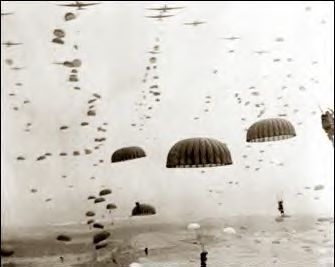
U.S. Army Skin tight "High & Tight" haircut
"GERONIMO!!!"

Operation: Varsity
1945. 24 March. 0100 Hours.
1,696 troop transports--mostly C-46 Commandos, 1,346 gliders and 2,153 fighters roar over Drop Zones across the Rhine. U.S. Army 17th Airborne Division- Paratroopers are screaming from the skies to secure the Rhine River crossing to begin the drive to Berlin and end the war, using America's newest arm of decision: Airborne Warfare. Among them is COL Edson Raff's 507th Parachute Regiment, the unit living on today as the U.S. Army jump school at Fort Benning, Georgia. This final push across where the previous Operation Market-Garden had stopped short just "A Bridge Too Far" is a triumph for the U.S. Airborne and the ground forces following behind. 82nd Airborne Commanding General James M. Gavin, watching from a plane and one of the few times he doesn't jump into a battle remarked in his book, On to Berlin:
"It was a pectacularly staged, typical Montgomery set piece. Never having viewed an Airborne operation as a spectator, I flew up from Sissone in a DC-3, a troop carrier transport. We flew over the operation at 2000 feet, and it was an awesome spectacle"


Short hair good for NBC protection
Except for extreme cold weather climates, more than a short head of hair is counterproductive and an invitation for disease vectors and insects to attack the Soldier. Short hair stays away from the straps of the Field Protective Mask (FPM) to insure a good air-tight seal against the skin.
Maintaining the "high & tight" possible in the field
Another benefit of a skin tight "high & tight" haircut is that it can be maintained in the field by the individual Soldier using disposible shavers and the "buddy system" to shave around the backside of the head evenly. This keeps the Soldier "squared away" for NBC FPM wear, high morale and saves him money and trips to the barbershop.
An excellent way to perpetuate the high & tight would be if the Meal-Ready-to-Eat had its plastic spoon molded with some rails on its handle to act as a shaver. This way, Soldiers need not have to carry plastic razors which break easily, only a set of flat shaving cartridges to interface with the MRE spoon handle. These shaving cartridges in self-lubricating/cleaning mode could last longer to shave the Soldier's face and head. The MRE spoon end would have tines cut-out on the end to be a "spork" and on the opposite handle end have a set of disposible toothbrush bristles for oral hygeiene using a packet of multi-use soap in the MRE.
Current logistical doctrine is 7 gallons of water per day per man in the desert. Supplying this water robs the Airborne force of its mobility and firepower by water buffalos and cans being taken instead of light armored fighting vehicles that can give these early-entry forces the SHOCK ACTION needed to prevail on the increasingly urbanized 21st Century battlefield. This is too much water clogging the logistics system, and instead Soldiers need to be able to collect and purify their own water whenever possible to regain 4-7 mph foot mobility on par with a Soldier in Sherman's Army in the Civil War or Darby's Rangers of WWII.
The more we can make the individual Soldier-Paratrooper self-sufficient, the more our logistics system can be freed to deliver war-winning ammunition, AFVs, combat units to win the fight quickly with the least amount of casualties.
REFERENCES:
U.S.Army Airborne in action by Leroy Thompson, 1992, Squadron-Signal Publications, Carrollton, Texas
FEEDBACK!!!
"GENDER EQUALITY IN OUR MILITARY
Many male servicemen are irritated by the problems caused by increasing the number of women in our military. In the past, women were rare and GIs were happy to cover for the "weaker sex". However, now that women comprise 30 - 50 percent of many support units and ship crews, allowing exceptions for "the ladies" is no longer possible. If women are to be equal members of the military team, these changes must be adopted.
#1 ESTABLISH A 3-INCH MAXIMUM HAIR LENGTH FOR WOMEN.
Male hair lengths are limited to three inches on top, tapered down to the natural hairline. This is for uniformity as well as safety and sanitation during field operations. Although females must perform in the same environment, they have no restrictions, and many have hair down to their buttocks.
Although women are supposed to keep their hair bundled up, loose strands are common. Long hair is a serious safety concern, and attracts fleas and ticks. Requiring similar haircuts as men may be extreme, but women should be limited to three inches overall (e.g. to the bottom of their shirt collar). This would still allow various hair styles, while increasing work safety, field sanitation, and uniformity.
#2 KEEP WOMEN ON SHIPS UNTIL THEY ARE 3-4 MONTHS PREGNANT.
Navy policy outlined in NavAdmin 060/94 requires that pregnant women be immediately detached from deployed ships. The other services usually send women home from deployments as soon as they are found to be pregnant. They are never replaced, so their fellow GIs must pick up the slack after they jet home early. This problem was recently highlighted by the former commanding officer of the L.Y. Spear who reported that he lost 63 of 389 female sailors due to pregnancy during the previous year.
If a woman becomes pregnant, she is not disabled, and can continue her mission for another three months. In the civilian world, many women continue working past the 8th month of pregnancy. Certainly, tough, disciplined, military women can keep working up to the 4th month.
Regulations must be updated so that women are not detached from ships or sent home from deployments until they are 3-4 months pregnant. This will increase readiness and ease their burden on other servicemen. In addition, it is a tremendous waste of money and time to detach and fly home a newly pregnant female whose ship is due to return to its home port within four months. A female who violates orders and become pregnant while on deployment should not be rewarded with an airline ticket home.
Someone may express concern that a women "with child" may fall and injure the fetus. However, any serviceman may fall and injure their head, but they are not sent home. In fact, doctors encourage women to stay active and work during the first few months of pregnancy."
Carlton Meyer, Weapons analyst & Military reformer


 Return to U.S. Army Airborne Equipment Shop
Return to U.S. Army Airborne Equipment Shop